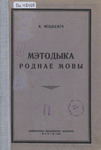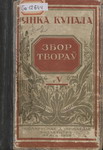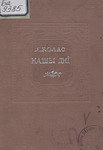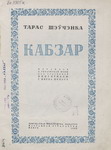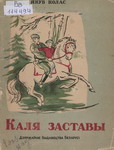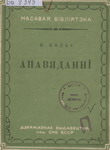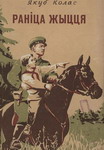
Yanka Kupala and Yakub Kolas: the chronicles of life and work
 |
|||
|
YANKA KUPALA (1882–1942)
|
YAKUB KOLAS (1882–1956)
|
||
|
7 July
1882
(New Style)
|
The birth of Ivan Daminikavich Lutsevich in the family of tenant farmers Dominik Lutsevich and Benigna Lutsevich (maiden name – Volosievich) in Vyazanka, a folwark settlement in Radoshkovichy district, Minsk Province.
|
3 November 1882
(New Style)
|
Konstantin Mitskevich (Konstantin Mikhajlovich Mitskevich), born on steading Akinchitsy, in Minsk Poviet, Minsk Province (today town Stolbtsy in Minsk Region). Parents: Mikhal Mitskevich and Anna Mitskevich (maiden name – Lyosik), peasants from village Nikolajevshchina (12 km from Stolbtsy).
|
|
1883–1889
|
The family of the landless tenant Lutsevich has to move constantly: Borisovshchina – Yuzefovo, Logoyshchina – Kosino, Minsk Uyezd – Sennitsa.
|
1890–1904
|
The Mitskevich family lives in forestry Albuts near Nikolajevschina. Konstantin learns himself Russian reading and writing. For two winters, a "director" (a boy who just left a people’s school) teaches him and his brothers.
|
|
1889–1891
|
Getting education at a folk school in village Sennitsa, later he is tutored in Minsk.
|
1892–1894
|
He goes to people’s school in Nikholajevshchina.
|
|
1890
|
April, the family leaves for Minsk.
|
1894
|
At the age of 12, he writes his first poem "Вясна" (The Spring).
|
|
1897
|
For one year he graduates from a two-year college in village Belaruchi.
|
1895–1897
|
He writes his first prose, ethnographic essay "Наша сяло, людзі і што робіцца ў сяле" (Our Village, People, and What Happens in the Village). The manuscript features author’s note "Запісаў Кастусь Лапаць" (Noted by Kastus Lapats). This is his first pen name.
|
|
1902
|
The year of great tragedies: the death of his father, brother and two sisters. Since that time, he has to work hard. As the eldest son Kupala takes on his own shoulders all concerns for the family.
|
1898–1902
|
K. Mitskevich studies at Nesvizh pedagogical seminary.
|
|
1903–1904
|
He works as a tutor and clerk. The first poem dedicated to his sister is written in estate Selishche.
The publication of the first poet’s poem "Modlitwa" (A Prayer) in Polish in the newspaper Ziarno (1903). He publishes poems in Polish in this magazine and signs them with the initials "I. L" under the pen name "К-а".
The first poem in his native language "Мая доля" (My Destiny) is written (15 July 1904).
|
1902–1905
|
He works as a teacher in villages Lyusino (today Gantsevichi Region) and Pinkovichi (today Pinsk Region).
|
|
1905–1906
|
On 15 May, the publication of the first poem "Мужык" (The Peasant) in Belarusian in the pages of the Russia-language newspaper Severo-Zapadnyi Krai in Minsk.
Since that time the writer uses a pen name Yanuk Kupala instead of his real name Ivan Lutsevich.
There are written poems "Чаго б я хацеў" (What I Want?), "Думы маркотныя" (Sad Thoughts), "Хлеб" (Bread), revolutionary poems "Зашумеў лес разгуканы" (A Forest Noised), "Спрасоння" (At Half-Asleep), "Што ты спіш?" (Why Do You Sleep?), "Пойдзем" (Let’s Go); poems "Нікому" (To Nobody), "Зімою" (In Winter), "Адвечная песня" (The Eternal Song).
|
1906
|
January. As a punishment for his public work, K. Mitskevich is moved to Verkhmensk people’s school (today Smolevichi Region).
On 9–10 July, he participates in the illegal meeting of teachers in Nikolajevschina.
|
|
1905–1908
|
He works in a distillery in estate Semkovo of Minsk Poviet and works as an assistant of a distiller in Yakhimovschina (Vilenski Poviet) and estate Dolnyy Snov (Novogrudski Poviet).
|
1906–1907
|
Y. Kolas lives at his relatives in forestry Smolyarnya where illegally opens a private school. He starts to write the textbook "Другое чытанне для дзяцей беларусаў" (The Second Reading for Belarusian Children).
Under the pen-name "Uncle Kastus" Yakub Kolas writes an article "Belarusian People’s School" dedicated to the Belarusian language which appears in newspaper Nasha Niva.
|
|
1907
|
On 11 May, the newspaper Nasha Niva publishes his poem "Касцу" (To the Reaper), which becomes his first appearance in the Belarusian-language press. From July to September 1907, this newspaper releases new works "Лета" (Summer), "Ці гэта многа?" (Is It Much?), "Непагода" (Bad Weather), "Вучыся…" (Study…), "Былі ў бацькі тры сыны…" (A Father Has Three Sons…) and etc.
|
1907
|
He works in Vilna as a head of literary department of the newspaper Nasha Niva but in few weeks is forced to leave by the police.
|
|
1908
|
In St. Petersburg the publishing house Zaglyane sontsa i u nasha akontsa (Загляне сонца і ў наша аконца) releases his first book of poems "Жалейка" (The Flute).
September. Y. Kupala moves to Vilna, works as an editor in Nasha Niva and a librarian in the private library of B. L. Danilovich "Knowledge".
|
1908–1910
|
On 15 September 1908, Y. Kolas is sentenced to 3 years in prison for his participation in the program of the All-Russian Union of Teachers.
Y. Kolas is imprisoned in Minsk prison where he writes poems "Мужык" ("Peasant"), "Покліч" (Call), "У астрозе" (In Prison), "Сохну марна я ў астрозе" (Wasting Away in Prison), "Пісьмо з астрога" (A Letter from Prison), "У астрозе вясной" (Spring in Prison), "Турэмная камера" (The Cell) and others.
The poems are partly published in newspaper Nasha Niva in 1908–1911 and in his first book "Песні-жальбы" (The Songs of Complaint) (1910). Some poems ("Мужык" (Peasant), 1909) and others appears in print after the October Socialist Revolution only.
|
|
1909
|
October – November. He leaves his job in Nasha Niva and goes to work to estate Benin of NovogrudokUyezd (Minsk Province) where he spends about 2 months. Coming back to Vilna he stays without work.
He writes poems "У Піліпаўку" (To Pilipauka) and "За што?" (What For?).
|
1909
|
The publishing house Zaglyane sontsa i u nasha akontsa in St. Petersburg publishes his book "Другое чытанне для дзяцей беларусаў" (The Second Reading for Belarusian Children).
|
|
1910–1911
|
Kupala attends A. Cherniajev’s courses, lodges at the apartment of librarian of Petersburg University, professor B. Epimakh-Shipilo. The review of the collection “Guslar” appears in “Nasha Niva” |
1910–1911
|
The poet’s first book "Песні жальбы" (Songs of Complaint) appears in Vilna.
In March – May he writes a short story “Як дзядзька ездзіў у Вільню і што ён там бачыў” (How My Uncle Went to Vilna and What He Saw There) that becomes the beginning of his poem “Новая зямля” (The New Land).
On 15 September he is released from prison.
On 30 September, 1910, a review of the first poetry collection of Yakub Kolas Songs of Complaint appears in newspaper Nasha Niva.
In November – February, 1912, he is unemployed, lives in Luninets, Pinsk Uyezd, at his friend V. Filippovich, gives paid lessons to children of railwaymen.
He starts working on his lyrical and epic poems The New Land and Symon the Musician.
|
|
1912 |
August. He arrives in village Nikolajevshchina and farm-stead Smolnya where he first meets Yakub Kolas. In autumn, having taken Cherniajev’s courses, Y. Kupala returns to Vilna and starts working at the editorial office of “Nasha Niva”. At the end of year, Y. Kupala’s dramatic poem "Сон на кургане" (The Dream on the Barrow) appears in Petersurg.
On June 3rd, the play “Pavlinka” is finished in Okopy. |
1912 |
|
|
1913
|
On January 27th, for the first time the play “Pavlinka” is staged in Vilna by a Belarusian musically-theatrical circle. For the second time the comedy is performed in February in Petersburg by a Belarusian scientifically-literary circle of students. On August 15th, “Pavlinka” is staged in Rodoshkovichi by the Minsk Belarusian artistic circle under the direction of F. Zhdanovich.
Poems "Яна і я" (She and I) (1913), "Бандароўна" (Bandarouna) (1913), "Магіла льва" (The Lion’s Grave) (1913), drama "Раскіданае гняздо" (The Ruined Nest) (1913) and a comedy "Прымакі" (Prymaki) (1913) are written.
|
1913
|
K. Mitskevich marries Maria Kamenskaya, a teacher at Pinsk railway school to be married over 30 years and have three sons.
|
|
1913–1915
|
He leaves Vilna and works in Nasha Niva.
|
September 1911–1914
|
Y. Kolas is released and works as a teacher.
In 1911, he writes the first part of poem "Сымон-музыка" (Symon the Musician).
In 1912, he writes the second part of poem "Сымон-музыка" (Symon the Musician).
His first prose collection "Апавяданні" (Short Stories) is published in Vilna.
In 1913, short stories "Тоўстае палена" (Thick Billet) and "Нёманаў дар" (Neman’s Gift) and short stories in verse "Прапаў чалавек" (The Man is Missing) and "Батрак" (The Farm-Hand) are published in St. Petersburg.
In 1914, the second short stories collection "Родныя з’явы" (Native Phenomena) is published in Vilna.
|
|
1915
|
January. As the editor of Nasha Niva Kupala is accused by an interim committee in Vilna of releasing the article "Думкі" (Thoughts).
August. He leaves Vilna.
September. He moves to Moscow and enters the People’s University named after A.L. Shanyavsky.
|
1915
|
Y. Kolas with his family is evacuated to Moscow Province, mobilized and is at military service in Moscow, Perm and on the Romanian front.
|
|
1916–1917
|
23 January 1916. Kupala marries Vladislava Stankevich.
January. He is drafted into the imperial army. He serves in the road-building unit of Warsaw District Railway in Minsk, Polotsk and Smolensk. Being in Smolensk he meets the October Revolution.
No poems are written during 1916–1917 and until the fall of 1918.
|
1916
|
He graduates from Alexander Military School in Moscow and is at service in reserve regiment in Perm.
The play "Антось Лата" (Antos Lata) is written.
|
|
1919
|
After the announcement of the BSSR on 21 January he moves to Minsk. Kupala works in the People’s Commissariat of Education of the BSSR.
In Moscow, the publication of the first collection "Избранные стихи" (Selected Poems) translated into Russian. In Vilna, the publication of drama "Раскіданае гняздо" (The Ruined Nest).
He translates the work "Слово о полку Игореве" (The Tale of Igor’s Campaign) into Belarusian. This prosaic translation appears in print.
|
|
|
|
The 1920s
|
He works as the head of the library in the "Belarusian hattsy", edits the magazine Run (1920) and Volny stsyag (1920–1922). In the period between 1920 and 1922 he is seriously ill, but after recovery he returns to active social and literary activities.
Since the beginning of 1921 he is: Deputy Head of the literary-publishing department of the People’s Commissariat of the BSSR; a member of the Academic Committee of the Academic Center of the BSSR People’s Commissariat on the formation and adaptation of Belarusian terminology; a member of the Scientific Editorial Board of the BSSR People’s Commissariat which is considered works submitted for publication (later it is called the Commission, and Yanka Kupala is its chairman); one of the founders of the Belarusian Drama Theatre (1920), the Belarusian State University (1921), Institute of Belarusian culture (since 1922 he is its full member).
He is more than once subjected to repressions. In 1921, the poet is put under arrest, and his manuscripts are confiscated.
Since the 2nd half of the 1920s Kupala is publicly accused of being related to the movement of national democrats.
The first Belarusian State Theatre stages the play "Паўлінкa" (Paulinka).
He makes a translation of The International into Belarusian and a poetic translation of work "Слово о полку Игореве" (The Tale of Igor’s Campaign).
The collection of poems "Спадчына" (Heritage) (1922) appears.
|
1920s
|
In 1921 Y. Kolas returns to Minsk. He works as a member of the Scientific-terminological commission of the Peoples’ Commissariat of Education, the literary commission for gathering verbal folklore of the InBelKult; teaches at the Belarusian Pedagogical Technical School, lectures grammar and teaching of the Belarusian language at pedagogical courses in Slutsk, teaches the Belarusian language at the Belarusian State University.
It is very fruitful period in his life, work and literature activity.
The publication of a short story collection "Казкі жыцця" (The Tales of Life) (Kovno, 1921), the second poetry collection "Водгулле" (The Response) (Minsk, 1922), the poem "Новая зямля" (The New Land) (Minsk, 1923), the story "У палескай глушы" (In the Backwoods of Polesie) (Vilna, 1923).
|
|
1925
|
On 15 May, the giving of the title the BSSR People’s poet by the government in connection with the 20th anniversary of Kupala’s creative activity.
In the autumn he with a group of writers visits Czechoslovakia and Germany.
The publication of a collection of poems "Безназоўнае" (The Untitled).
The beginning of the publication of the first volume of the poetry collection "Збору твораў" (The Collection of Works) which contains poems "Жалейка" (The Flute), "Гусляр" (Guslar). |
1925
|
He finishes the remaking of the poem "Сымон-музыка" (Symon the Musician) (1911–1925), which is first published as a separate book.
He writes the play "Забастоўшчыкі" (The Strikers) (1925), the short stories collections "Першыя крокі" (First Steps), "Крок за крокам" (Step by Step), "На рубяжы" (On the Border) and "У ціхай вадзе" (In Quiet Waters) and starts the story "На прасторах жыцця" (On Life’s Expanses).
|
|
1926
|
He participates in the Academic Conference on the reform of the Belarusian spelling and alphabet.
The publication of the second volume of "Збору твораў" (The collection of works) ("Шляхам жыцця" (Along the path of Life)) and volume 3 ("Раскіданае гняздо" (The Ruined Nest), "Тутэйшыя" (The Locals), "Паўлінка" (Paulinka), "Прымакі" (Prymaki)). The appearance of collections "Апавяданні вершам" (Short Stories to Poems) (book 1 and 2) and a poem "Магіла льва" (The Lion’s Grave) in press.
|
1926
|
The Belarusian public celebrates the 20th anniversary of Y. Kolas’ creative activity.
On 18 October, the BSSR government rewards Y. Kolas the title of the BSSR People’s poet.
The story "На прасторах жыцця" (On Life’s Expanses) is finished and published in a short stories collection. The play "Вайна вайне" (War to War) is started.
The book of short stories "Казкі жыцця" (Tales of Life) is reedited; "Выбраныя апавяданні" (Selected Short Stories) and "Методыка роднае мовы" (The Methodology of the Mother Tongue) are published.
|
|
1927
|
April, he participates in the 8th All-Belarusian Congress of Soviets. He is elected as a candidate on the position of a member of the Central Executive Committee of the BSSR.
During August and September, the undergoing of the treatment in the city of Karlovy Vary (Czechoslovakia). At that time some poet’s poems appears in the Czechoslovak press.
|
1927
|
The story "В пущах Полесья" (In the Backwoods of Polesie) is started in 1924 is finished and published as a separate book.
"Выбраныя творы" (Selected Works) is published in Vilna (anniversary edition).
|
|
1928
|
He is elected as a full memberof the Academy of Sciences of BSSR.
The publication of the fourth and fifth volumes "Збор твораў" (The Collection of Works).
|
1928
|
On 13 October, Y. Kolas is elected as a full member of the Academy of Sciences of the BSSR.
The first volume of "Збор твораў" (Collection of Works) is published in two editions.
The book of children’s Belarusian fairytales adapted by Y. Kolas: "Воўк-дурань" (The Silly Wolf), "Два маразы" (Two Frosts), "Леў і воўк" (Lion and Wolf), "Як пеўнік ратаваў курачку" (How Cock Rescued Hen) are published.
The second editions of the poem "Сымон-музыка" (Symon the Musician), the collections of short stories "На прасторах жыцця" (On Life’s Expanses), "На рубяжы" (On the Border) and "Крок за крокам" (Step by Step).
The third edition of the story "In the Backwoods of Polesie" and the collections of short stories "Казкі жыцця" (The Tales of Life) and "У ціхай вадзе" (In Quiet Waters).
The story On Life’s Expanses is translated into Polish.
|
|
1929
|
Y. Kupala is elected as a full member to the Academy of Sciences of Ukraine.
The poems written before the October Revolution are published in the magazine Polymya № 2 and 3 in 1929 and № 5–6 in 1930.
|
1929
|
Y. Kolas is elected as a member of the Presidium and vice-president of the Academy of Sciences of the USSR.
The publications of the second volume of "Збор твораў" (Collection of Works).
People’s fairytales for children adapted by Y. Kolas "Зайчыкі" (Little Hares) and "Пчала і шэршань" (Bee and Hornet) appear.
|
|
1930
|
May. Kupala celebrates the 25th anniversary of his literary activity. In his honour the People’s Commissariat of Education of the BSSR establishes two scholarships named after Yanka Kupala: one – to the literary department of the Pedagogical Faculty of the Belarusian State University, the other – to Minsk Pedagogical college. The Belarusian State Publishing House gives a scholarship named after Y. Kupala in the literary department of Pedagogical Faculty of the Belarusian State University; the State Publishing House of the RSFSR gives two scholarships to Moscow State University.
In summer, the party organization – the newspaper Zvyazda – releases an article "Шлях паэта" (The Poet’s Destiny) by L. Bende, where Y. Kupala is declared as "an ideologist of bourgeois national revival". The poet’s relatives are disposed, and they are almost deported to the North. In the summer of that year, Kupala is called to the State Political Directorate (GPU) to interrogate on a false charge of Union of Liberation of Belarus, to ascribe him to the leadership of this mythical organization. In November, he once again testifies to the GPU. He conducts himself during interviews bravely and nobly. It is marked even by interrogators; he rejects all accusations against himself and others. The persecution by repressive organs and severe psychological condition lead to the fact that on 20 November Y. Kupala commits suicide attempt, but he is rescued.
December. In the newspaper Zvyazda he publishes a "confession" letter, where he is forced to admit "mistakes" and "harmful attitudes", promises to break with the "bourgeois nationalistic revival" and "gives all his forces to socialistic construction".
|
1930
|
The story "На прасторах жыцця" (On Life’s Expanses) (Minsk) is published in a separate book (Minsk), the second edition of the story "У глыбі Палесся (In the Backwoods of Polesie) is published.
The writer starts the story "Адшчапенец" (The Renegade).
In autumn 1930, Y. Kolas and Y. Kupala are arrested and forced to write "confession" letters. On 30 October, 1930, Y. Kolas publishes a letter in which he admits his "guilt" and repents of his "participation" in counter-revolutionary activity. It is believed the poet writes this letter under compulsion by the GPU BSSR.
|
|
1932
|
On 10 September, the public of the Republic celebrates the 50th anniversary of the birth of Yanka Kupala.
|
1932
|
On 3 November, the Belarusian public celebrates the 50th anniversary of Y. Kolas’ creative activity.
|
|
The 1930s
|
In 1930s, the works of Kupala are undergone a considerable revision of censorship, including collections of poems "Жалейка" (The Flute) and "Гусляр" (Guslar).
The publication of a book of poems "За што?" (What For?) ("Курган" (The Barrow), "Бандароўна" (Bandarouna), "Сват" (The Father of the Son-in-Law), etc.); a poem collection "Адцвітанне" (The Blossom Fading) (1930), "Песня-байка" (The Story-Fairy Tale) (1930) and a book "Сборник стихов" (Collection of Poems) (1930) in Russian; volume 6 and the second edition of volumeof "Збор твораў" (Collected Works) (1932); the poem "Над ракою Арэсай" (Over the River Oressa) (1933) in Belarusian and Russian.
|
1930s
|
The story "Адшчапенец" (The Renegade) (1932) is published as a separate edition.
Writes the story "Дрыгва" (The Quagmire) (1933).
|
|
1934
|
August. He takes part in the 1st All-Union conference of the USSR writers in Smolensk.
September. At the final sitting Y. Kupala is elected as a director of the USSR Writers’ Union. He participates in the 1st Plenum of the USSR Writers’ Union, appointed on the 1st All-Union conference of the USSR writers.
|
1934
|
Y. Kolas is elected as a director of the Union of Soviet Writers of the BSSR.
August. He participates in the 1st All-Union conference of the USSR writers in Smolensk.
|
|
1935
|
January. He takes part as a delegate in the 11th All-Belarusian Congress of Soviets. He is elected as a voting delegate to the Central Executive Committee of the BSSR at the 7th Congress of Soviets of the USSR.
From 29 January to 6 February, the participation in the 7th Congress of Soviets.
March. The participation in the 2nd Plenum of the USSR Writers’ Union (Moscow).
On 11 July, he is awarded the diploma of the Supreme Soviet of the BSSR.
October. He visits Czechoslovakia with a delegation of Soviet writers and reads some of his poems at the University of Prague. Translations of his poems are appeared in the Czech periodicals.
On 11 December, the 30th anniversary of the literary activity of Y. Kupala.
A collection of poems "Выбраныя творы" (Selected Works) are appeared in "School Series"; the publication of the poem "Над ракою Арэсай" (Over the River Oressa) in separate editions in Polish and Lithuanian.
|
1935
|
January. As a delegate he participates in the 11th All-Belarusian congress of the Soviets; he is elected as a member of the Central executive Committee of the BSSR andhas acasting voteat the 7th Congress of the Soviets of the USSR.
From 29 January to 6 February, he participates in the 7th congress of the Soviets.
On 20 June, he participates in the International Congress of Writers in Defence of Culture in Paris.
There are published the children’s book "Міхасёвы прыгоды" (Mikhas’ Adventures); the short stories collection "Selected Works" of the "School Series". The second edition of "Дрыгва" (The Quagmire). The poetry collection "Избранные стихи" (Selected Poems) are translated into Russian.
|
|
1936
|
February. The participation in the 3rd Plenum of the USSR Writers’ Union (Minsk).
March. He is elected as a member of the Committee of the BSSR for organizing of the 100th anniversary from the death of A. Pushkin. The translation of Pushkin’s poem "Медный всадник" (The Bronze Horseman) into Belarusian.
November. As a delegate he takes part in the 12th Extraordinary Congress of Soviets of the BSSR. He is elected to the drafting committee for the final establishment of the Constitution of the BSSR. He participates as a delegate in the 8th Extraordinary Congress of Soviets of the USSR.
The publication of a collection of poems "Песня будаўніцтву" (The Song of Construction), "Выбраныя творы" (Selected Works), volume 2, "Над ракою Арэсай" (Over the River Oressa) (edition 3), a comedy "Прымакі" (Prymaki).
The publication of a collection of poems "Под новым солнцем" (Under a New Sun) (Moscow) in Russian and the poem "Над ракою Арэсай" (Over the River Oressa) (Kiev) in Ukrainian.
At the All-Union competition for the best song, which is announced by the newspaper Pravda, Kupala awards the second prize for the song "Выпраўляла маці сына" (A Mother Sends her Son).
|
1936
|
On 1 September, the Belarusian public celebrates the 30th anniversary of Y. Kolas’ literary work.
November. Y. Kolas is a delegate of the 8th Extraordinary congress of the Soviets that adopted the new Constitution of the USSR.
He participates in the 11th Extraordinary Congress of the Soviets of the BSSR.
The publication of the first volume of the poet’s "Выбраныя творы" (Selected Works) including poetry written between 1904 and 1935. The publication of the third edition of (The Quagmire) and the book of children’s verses "Савось-распуснік" (Savos the Slattern).
"Дрыгва" (The Quagmire) is translated into Polish and Yiddish (Minsk).
The Belarusian State Theater named after Yakub Kolas (Vitebsk) stages the play "Вайна вайне" (War to War).
|
|
1937
|
The poet once again is under the threat of being arrested. His name appears in a list of selected victims. He manages to avoid arrest.
February. He participates in the 4th Plenum of the USSR Writers’ Union (Moscow), dedicated to the 100th anniversary of the death of A. Pushkin.
December. He participates in the 5th Plenum of the USSR Writers’ Union (Tbilisi), dedicated to celebrating the 750th anniversary of Shota Rustaveli’s poem "Витязь в тигровой шкуре" (The Knight in the Panther’s Skin). Y. Kupala devotes to this outstanding poet the poem "Сонечнаму Шота Руставелі" (To Sunny Shota Rustaveli).
The publication of a collection of poems "Беларусі ардэнаноснай" (To Honour Belarus) which is a peculiar anthology of the poet works in the Soviet time, "Выбраныя творы" (Selected Works), volume 3, the poem "Над ракою Арэсай" (Over the River Oressa) (edition 4), a collection for children "Хлопчык і лётчык" (A Boy and a Pilot) and a translated poem of A. Pushkin’s poem "Медный всадник" (The Bronze Horseman) by Kupala.
The publication of a collection of poems "Избранные стихи" (Selected Poems) (Smolensk) in Russian and the poem "Вибрані твори" (Selected works) (Kiev, Kharkov) in Ukrainian.
|
1937
|
The publication of the new poetry book "Нашы дні" (Present Days) (Minsk).
He writes articles on A.S. Pushkin’s poetry and his influence on the Soviet poetry timed to the 100th anniversary from the death of Russian poet.
February. Y. Kolas participates in the 4th Plenum of the Board of the USSR Writers’ Union (Moscow) dedicated to the 100th anniversary of A.S. Pushkin’s death.
The Belarusian State Theater named after Yakub Kolas (Vitebsk) stages Y. Kolas’ play "In the Backwoods of Polesie" based on "Дрыгва" (The Quagmire).
The publication of the collection of poems "Выбраныя творы" (Selected works), the second edition of the children’s book "Міхасёвы прыгоды" (Mikhas’ Adventures), the forth edition of "Дрыгва" (The Quagmire).
|
|
1938
|
Y. Kupala visits a flax-scutching mill in Orsha and a factory of artificial silk in Mogilev, together with Y. Kolas goes to Ukraine.
|
1938
|
The drama "Вайна вайне" (War to War) (1926–1938) is finished and is translated into Russian.
The publication of the poetry collection "Выбраныя творы" (Selected works), a separate book of the children’s fairytale in verse "Рак-вусач" (Whiskered Crayfish).
The article about A.M. Gorky "Писатель-гражданин" (Writer and Citizen). The article about M. Gorky "Писатель-гражданин" (Writer and Citizen) is written.
|
|
1939
|
On 31 January, the Presidium of the Supreme Soviet of the USSR for the outstanding contribution to the development of Soviet literature awards Kupala the Order of Lenin.
March. The publication of Shevchenko’s "Кобзарь" (Kobzar) in Belarusian under the editorship of Y. Kupala and Y. Kolas.
May. He takes part in an anniversary Plenum of the USSR Writers’ Union (Kiev), dedicated to the 125th anniversary from the birth of Taras Shevchenko.
September. In Yerevan, he takes part in the celebration of the 1000th anniversary of the Armenian national epic "Давид Сосунский" (David Sosunsky) where he gives a speech at the solemn meeting.
October. As part of the Belarusian Soviet delegation he welcomes the National Assembly of Western Belarus in Bialystok.
December. He is elected as a member of the Minsk City Council.
He writes a cycle of poems "На заходнебеларускія матывы" (On the Western Belarusian Motives), the poem "Тарасова доля " (Taras’ Destiny), etc. He translates Taras Shevchenko’s poem "Катерина" (Catherine) and a number of his works.
|
1939
|
Y. Kolas is rewarded with the Order of Lenin for his contribution to the Soviet literature.
March. He participates in the Belarusian delegation for greeting of the 8 congress of the Party.
The publication of T. Shevchenko’s "Кабзар" (Kobzar) in Belarusian under the editorship of Y. Kupala and Y. Kolas.
In autumn of 1939 he starts to write the poem "Рыбакова хата" (The Fisherman’s Hut) (1939–1947) which he at first wants to title "На крэсах усходніх" (At the Western Outskirts).
The publication of the 3rd volume of "Выбраныя творы" (Selected Works), two children’s books: "Каля заставы" (At the Frontier Post) and a fairytale "Дзед і мядзведзь" (Old Man and Bear).
The play "В пущах Полесья" (In the Backwoods of Polesie) (Мoscow – Leningrad) and "Избранные стихи" (Selected Poems) (Moscow) translated into Polish.
|
|
1940
|
On 24 March, he is elected as a deputy of the Supreme Council of the BSSR from the Lida city constituency.
April. He is elected as a member of the Committee on Stalin Prizes.
November. In Moscow, he gives a speech at the festive evening, dedicated to 85th anniversary of the death of Adam Mickiewicz.
On 8 December, the public widely celebrates the 35th anniversary of the literary activity of Kupala.
|
1940
|
On 24 March, he is elected to the Supreme Soviet of the BSSR as a representative of the western regions of Belarus.
The publication of Y. Kolas’ article about A.M. Gorky "Человек большого сердца" (The Man of a Great Heart) in the newspaper Pravda.
The publication of the book of selected short stories "Апавяданні" (Short Stories) of the series "Public Library" ("Масавая бібліятэка"), the children’s verses collection "Вершы" (Verses) and "The Quagmire".
|
|
1941
|
On 15 March, the CPC awards Y. Kupala with the Stalin Prize of the decree for the collection of poems "Ад сэрца" (From the Heart) (Minsk, 1940).
May. With a delegation of Belarusian writers and scholars he visits Vilna in order to strengthen cultural ties between two brotherly peoples.
On 14–15June, he takes part in the First Congress of the Soviet Writers’ Union of Latvia.
The Great Patriotic War begins when the poet is in Kaunas. In the early days of the war his archives and library burns in Minsk.
On 23 June, he arrives in Minsk, because of coming of Hitler’s forces he goes to Levki, then from this village he goes by car to Moscow, in which he arrives on 7 July.
On 17 July, his article "Не будет белорус рабом немецких баронов" (A Belarusian man won’t be a slave of German barons) appears in the newspaper Izvestia.
On 18 July, he writes an article "Германский фашизм – злейший враг белорусского народа" (German fascism is the bitterest enemy to the Belarusian people) in the newspaper Pravda.
On 22 July, he writes the article "Белорусский народ не позволит себя закабалить" (The Belarusian people will not allow ourselves to enslave) in the newspaper Krasnyy Flot.
On 11 August, he is elected as a member of the Presidium of the All-Slavic Committee.
September. The publication of Kupala’s poem "Беларускім партызанам" (To Belarusian Partisans) in the newspaper Krasnaya Zvyazda.
Since early November Y. Kupala lives in working village Pechische near Kazan.
From the very beginning of the war Y. Kupala actively involves in the fight. As a member of the Presidium of the All-Slavic Anti-Fascist Committee, he speaks at the anti-fascist rallies, signs an appeal to fellow Slavs with a call to rise to the liberation struggle against fascism, and participats in the 1st All-Slavic rally and in the scientific session of Academy of Sciences of the BSSR (Kazan), where he reads a lecture on "World War II and the Belarusian intellectuals". His fiery poem "Беларускім партызанам" (To Belarusian Partisans) and articles are published in newspapers Pravda, Izvestia, Krasnaya Zvyazda, etc.
The publication a collection of poems "От сердца" (From the Heart) (Moscow) in Russian, "Выбраныя вершы і паэмы" (Selected Works and Poems) in Turkmen (Ashkhabad); a brochure "Народ-мститель" (The people-avenger) in Russian (published by the newspaper Savetskaya Belarus) and a collection of poems "Стихи о Родине" (Poems about the Motherland) (Moscow).
|
1941
|
The collection of short stories for children "У старых дубах" (In the Old Oaks) and a fragment of the poem "Новая зямля" (The New Land) under the title "Начаткі" (The Beginnings) is published in an edition for children.
The children’s verses "Соколята" (The Eyas) (Minsk) and "Ягоды" (Berries) (М.–L.) are published in Russian.
June. He is evacuated from Minsk.
September. The publication of the appeal "На бітву, браты-беларусы!" (Bear for Action, Belarusian Brothers!).
The publication of the first collection of verses written at the beginning of the Great Patriotic War and translated into Russian (Moscow).
During the Great Patriotic War the poet lives in Kliazma (Moscow Region), Tashkent and Moscow.
|
|
1942
|
On 28 June, Ivan Daminikovich Lutsevich (Yanka Kupala) tragically dies in hotel "Moskva" under mysterious circumstances (fell in the stairwell from the 10th floor). There are three versions of what has happened: an accident, suicide and murder.
He is buried at Vagankovo cemetery in Moscow.
After Yanka Kupala’s death the poetry collection "Беларускім партызанам" (To Belarusian Partisans) appears.
|
1942
|
March. The appeal to the Belarusian people "На бітву, браты-беларусы!" (Bear for Action, Belarusian Brothers!)
On 4–5 March. He speaks at the 2nd All-Slavic Meeting (Moscow).
October. He writes the article "Сеяць смерць нямецкай погані" (Breed Death to Nazi Scum).
The publication of the poetry collection "Адпомсцім" (We’ll Revenge) (Moscow).
"Голос земли" (The Voice of the Land) is translated into Russian and "Избранные стихи" (Selected Poems) is translated into the Uzbek language (Tashkent).
|
|
1962
|
The cinerary urn is reburied at Minsk Military Cemetery near the grave of Y. Kolas.
|
1943
|
Y. Kolas is a candidate to the Communist Party.
He is rewarded the Red Banner Order for his contribution to partisan movement.
The poem "Суд у лесе" (Tribunal in theWood) is finished and published in a separate edition. A new book of poetry "Голос земли" (The Voice of the Land) (Moscow) is released.
|
|
|
|
1944
|
On 7 January, in honor of the 25th anniversary of the BSSR and for the achievements in the field of science, the title of the honored worker of the BSSR is rewarded to Y. Kolas.
He returns to Minsk after its liberation.
|
|
|
|
1945–1956
|
After the war, from the middle of the 1940th and to his dying day, Y. Kolas works at the Academy of Sciences of Belarus; he is known as a political figure: deputy of the Supreme Soviet of the USSR and the Supreme Soviet of the BSSR, member of the Central Committee at the 20–21st Congresses of Communist Party and the All-Union Committee for State Prizes in the field of literature and art, vice-chairman of the All-Slavic Antifascist Committee, chairman of the Belarusian one and a member of the Soviet Committee for the Defense of Peace .
|
|
|
|
1946
|
Y. Kolas receives the Stalin Prize of the first degree for his works written during the Great Patriotic War.
In honor of the 40th anniversary of his literary work Y. Kolas is rewarded the Labor Red Banner Order.
The publication of the poem "Адплата" (The Retribution) in a separate edition. There are also published the poetry collection "Мой дом" (My Home), the poetry collection "Вершы" (Verses), volume 1, and the book "Паэмы" (Poems) including "Родная зямля" (The New Land) and "Сымон-музыка" (Symon the Musician). The publication of the sixth edition of "Дрыгва" (The Quagmire).
|
|
|
|
1947
|
February. He is elected as a deputy of the Supreme Soviet of the BSSR.
The Plenum of the USSR Writers’ Union elects him as a member of the secretariat of the USSR Writers’ Union.
The poem "Рыбакова хата" (The Fisherman’s Hut) (1939–1947) is finished and published, the children’s book "Mikhas’ Adventures" of the series "Schoolchildren’s First Library"is republished, the book of selected verses translated into Russian "Стихи" (Verses) of the series "School Library" is published.
|
|
|
|
1948
|
The publication of the book of selected works "Вершы і паэмы" (Verses and Poems) of the series "30 years of the BSSR, 1919–1949" ("ХХХ год БССР, 1919–1949").
"В пущах Полесья" (In theBackwoods of Polesie) and "Дрыгва" (The Quagmire) are translated into Russian and included in one book under the title "В пущах Полесья" (In the Backwoods of Polesie). The "Избранные стихи" (Selected Poems) translated into Russian of the series "Ogoniok Library".
|
|
|
|
1949
|
January. In honor of the 30th anniversary of the BSSR he is rewarded the Order of Lenin.
April. He receives the Stalin Prize for his poem "Рыбакова хата" (The Fisherman’s Hut).
He is elected as a member of the board of the BSSR Writers’ Union and a member of the Presidium of the BSSR Writers’ Union.
He begins to publish the first chapters of the third part of the trilogy "На ростанях" (At a Distance) in the magazine Polymya (№ 2 and 11).
The publication of his speeches for peace.
|
|
|
|
1950
|
March. He is elected as a deputy of the Supreme Soviet of the USSR.
June. He participates in the Plenum of the Soviet Committee for the Defense of Peace.
October. He is elected as a member of the Soviet Committee for the Defense of Peace.
The publication of the short stories collection "Раніца жыцця" (The Dawn of Life).
|
|
|
|
1951
|
The publication of the children’s book "Міхасёвы прыгоды" (Mikhas’ Adventures).
September. He is elected as a member of the presidium and chairman of the Belarusian republican Committee for the Defense of Peace.
November. He participates in the 3rd All-Union Conference of Peace Champions.
|
|
|
|
1952
|
On 8 January, the Presidium of the Supreme Soviet of the USSR rewards him the Order of Lenin.
September. He participates in the 20th Congress of the Communist Party. He is elected as a member of the Central Committee and delegate to the 19th Congress of the All-Union Communist Party.
On 3 November, for his contribution to the Soviet literature and in honor of his 70th anniversary the Presidium of the Supreme Soviet of the USSR rewards him the Order of Lenin.
The documentary film "Народны паэт" (The People’s Poet) is released.
|
|
|
|
1953
|
January. He participates in the session of the Academy of Sciences of the BSSR and is elected as a vice-president of the Academy of Sciences.
|
|
|
|
1954
|
February. He participates in the 21st Congress of the Communist Party and is elected as a member of the Communist Party and the Central Committee of Communist Party.
March. He is elected as a deputy of the Supreme Soviet of the USSR.
May. He participates in the celebrations timed to the 300th anniversary of the reunion of Ukraine and Russia.
June. He finishes the third part of the trilogy “На ростанях” (At a Distance).
September. He participates in the 3rd Congress of the BSSR writers.
December. He participates in the 2nd All-Union Congress of Soviet Writers in Moscow as a member of the Belarusian delegation and is elected as a member of the Board of the Union.
|
|
|
|
1955
|
On 25 February, in Moscow for his contribution to Belarusian literature and in honor of the Decade of Belarusian Art and Literature, the Presidium of the Supreme Soviet of the USSR rewards him the Order of Lenin. Publications:
The publication of the trilogy "На ростанях" (At a Distance), and the collection "Пьесы" (Plays) including "Забастоўшчыкі" (Strikers), "У пушчах Палесся" (In the Backwoods of Polesie), "Вайна вайне" (War to War).
|
|
|
|
1956
|
January. He participates in the 22nd Congress of the Communist Party and is elected as a member of the Central Committee of Communist Party and a delegate to the 20th Congress of the Communist Party of the USSR.
He works on the poem "На шляхах волі" (On the Roads of Freedom).
February. He participates in the 20th Congress of the Communist Party of the USSR.
The publication of the collection "Міхасёвы прыгоды" (Mikhas’ Adventures) (poems, fairytales, verses).
On 13 August 1956, Konstantin Mikhajlovich Mitskevich (Yakub Kolas) dies at his working desk.
He is buried in Minsk on the Military cemetery.
|

































